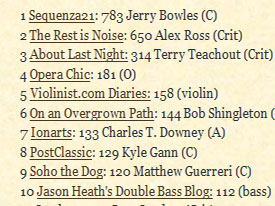I am not, generally speaking, a big fan of movie music although the ability to produce useful art on demand appeals to my lifetime hack sensibilities. I don’t think Bernard Hermann and Miklos Rozsa are overlooked concert hall geniuses who might have been among the greats had they not traded their souls for big houses in Beverly Hills. They are what they are.
Writing for films is a craft, not an art, but it is a demanding craft that not every composer–even a great one–can do. In Andre Previn’s memoirs of his Hollywood years (which is called No Minor Chords because Irving Thalberg once degreed that no MGM picture should ever contain music with a minor chord), Previn writes of having taken one of the big moguls, Louis B. Mayer, I believe, to the Hollywood Bowl to hear the Sibelius Violin Concerto. Afterwards, he asked him how he liked it. “Well,” Mayer said. “It was good but he couldn’t write for pictures.”
I suspect Mr. Mayer was right. Many “serious’ composers (and writers, too, think of Faulkner) are not good at writing for pictures.
 The latest example of underachievement in the category of film music is Osvaldo Golijov, whom Francis Ford Coppola specifically commissioned to write the music for Youth Without Youth, Coppola’s recent comeback film which was seen by absolutely nobody. On the surface, Golijov’s enormous multicultural sound palette would seem perfect for film. Alas, the result is more insipid than limpid, if you know what I mean.
The latest example of underachievement in the category of film music is Osvaldo Golijov, whom Francis Ford Coppola specifically commissioned to write the music for Youth Without Youth, Coppola’s recent comeback film which was seen by absolutely nobody. On the surface, Golijov’s enormous multicultural sound palette would seem perfect for film. Alas, the result is more insipid than limpid, if you know what I mean.
 On the other hand, Jonny Greenwood of Radiohead fame nails his film debut with the score for There Will Be Blood. The music has to be pretty dramatic to match Daniel Day-Lewis’ over-the-top, spit-slinging, snot-dripping performance as a rabid early oil man but Greenwood pulls it off. So he’s channelling Penderecki, Gorecki, and Messiaen, originality is less important than conveying mood in film music. Like Ry Cooder, another unexpected star of film music, Greenwood shows himself to be a master of atmosphere and shifting physical and mental landscapes. If he wants to give up his day job, he’s probably got a future in Hollywood.
On the other hand, Jonny Greenwood of Radiohead fame nails his film debut with the score for There Will Be Blood. The music has to be pretty dramatic to match Daniel Day-Lewis’ over-the-top, spit-slinging, snot-dripping performance as a rabid early oil man but Greenwood pulls it off. So he’s channelling Penderecki, Gorecki, and Messiaen, originality is less important than conveying mood in film music. Like Ry Cooder, another unexpected star of film music, Greenwood shows himself to be a master of atmosphere and shifting physical and mental landscapes. If he wants to give up his day job, he’s probably got a future in Hollywood.
 The latest example of underachievement in the category of film music is Osvaldo Golijov, whom Francis Ford Coppola specifically commissioned to write the music for Youth Without Youth, Coppola’s recent comeback film which was seen by absolutely nobody. On the surface, Golijov’s enormous multicultural sound palette would seem perfect for film. Alas, the result is more insipid than limpid, if you know what I mean.
The latest example of underachievement in the category of film music is Osvaldo Golijov, whom Francis Ford Coppola specifically commissioned to write the music for Youth Without Youth, Coppola’s recent comeback film which was seen by absolutely nobody. On the surface, Golijov’s enormous multicultural sound palette would seem perfect for film. Alas, the result is more insipid than limpid, if you know what I mean.

